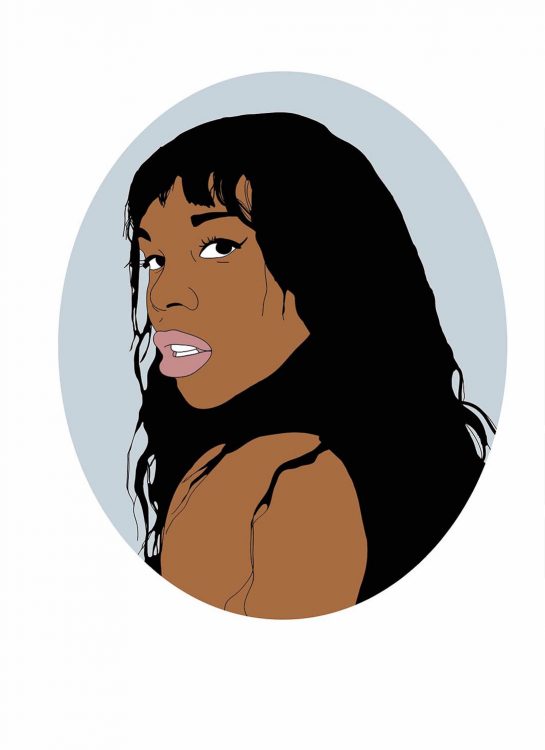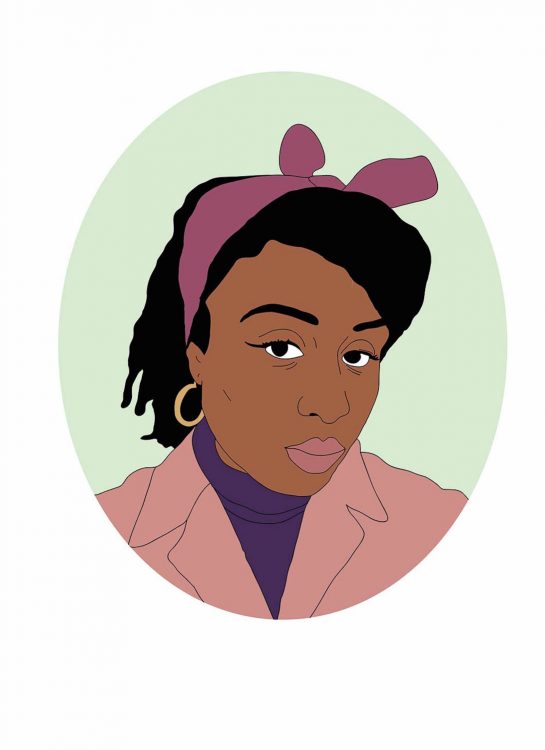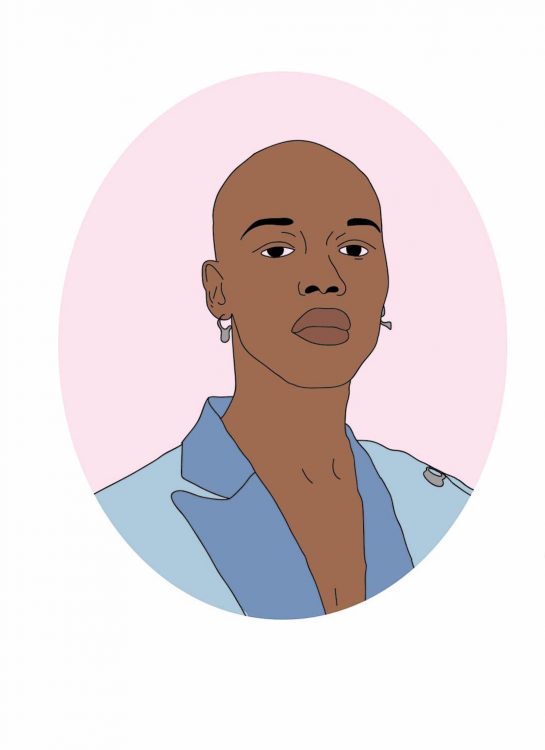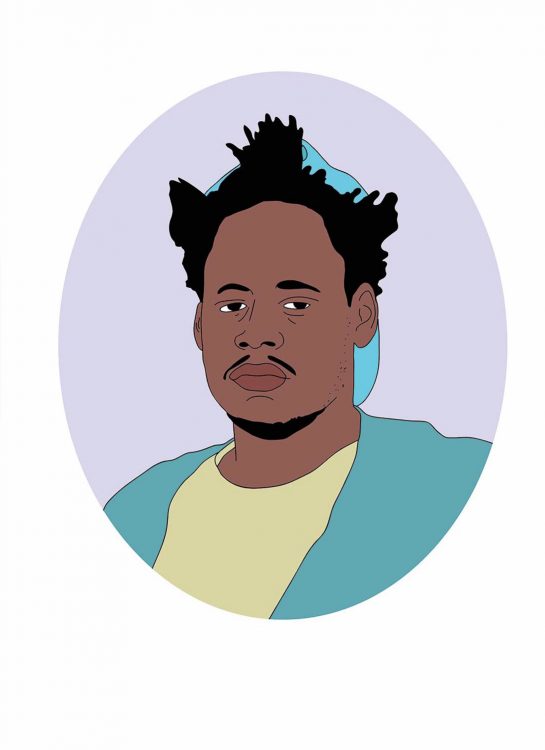- Words Yusuf Tamanna
- Illustrations Nadia Akingbule & Ben Gore
As LGBT History months kicks off, we look back to Notion 81 and an exploration of LGBTQI + POC point of view.
Some of the most inspiring and vital queer black voices in music share their experiences, both good and bad, as we take a deep dive into the reality of navigating the music biz as an lgbtqi+ identifying poc.
MNEK knows exactly what it means to be a queer black artist in the music industry.
“We’re always going to have to work twice as hard as our white counterparts for even a fraction of what they have,” he tells me over a crackly Facebook call in the early hours of Monday morning from Sydney. Having already worked with everyone from Beyonce to Madonna and Little Mix, the 23-year-old singer-songwriter and producer is currently gearing up to release his long awaited debut album later this year. I’m not sure if he’s aware of it or not, but he’s arguably the most prolific queer black artist in the UK today.
Despite his high profile, MNEK fully understands that he doesn’t necessarily fit the cookie-cutter mould the music industry has in mind when it comes to being a popstar. “I’m aware I do something different”, he admits. “The norm is straight and white and I’m neither. If it’s white and gay then that’s only half of what people [read: white people] can’t relate to, but if it’s both then it’s hard.”
He’s not wrong either. Earlier this year when NME listed the 10 musicians leading what it called “pop’s queer revolution” it featured the familiar faces of Olly Alexander and Troye Sivan, alongside relative newcomers Kim Petras and SOPHIE. A feature that originally set out to celebrate and promote queer artists and diversity on a large-scale platform, not only ghettoised queer musicians in general but also acted as the perfect example of the queer black experience in the music industry when out of the 10 spots on offer, only three were occupied by queer black artists.
This near-exclusion of an entire demographic of artists from a celebration of pop’s queer revolution highlighted a very important point; that while the visibility of white queer artists is increasing in the otherwise heteronormative music industry, queer black artists are still having to fight to have their presence acknowledged.
But why?
According to a study led by Stacy L. Smith, an associate professor at the University of Southern California, which looked into racial and gender diversity in the music industry, 42% of artists responsible for the 600 biggest songs between 2012-2017 belonged to underrepresented and ethnically diverse groups – well above the United States Census figure of 38.7%. Demonstrating a clear shift in audiences’ tastes and consumer habits, with more music listeners embracing artists who come from diverse backgrounds across a multitude of genres.
Though it’s a promising indication of change, it fails to address the fact that while the customer facing side of the industry may be brimming with black queer acts like Frank Ocean, Janelle Monae and Kaytranada, the back end – where the real decisions are made – is still largely dominated by straight white people. This is problematic because it can result in a disconnect between artists and their team. If there’s a gap in understanding due to cultural, racial and sexual identification differences, then it’s fair to say that this is going to impede on how the work of these artists is executed; whether that’s marketing, press, booking tours or any of the other nuts and bolts of the music business that an artist’s team are responsible for.


“How are they supposed to know how to manage and market an artist of colour, let alone a queer artist of colour?”, Shamir Bailey asks. The American singer-songwriter is already four albums deep into their career and was initially signed to XL Recordings, the home of FKA Twigs and Adele. But after the release of their debut album Ratchet in 2015, Shamir and XL amicably parted ways and they’ve been self-releasing music online ever since (recently with the help of inclusive indie label Father/Daughter Records).
“Being indie forced me to stop appeasing a part of the industry that honestly doesn’t have room for me and now I’m taking the unbeaten path.” It’s allowed Shamir to move away from the disco-tinged pop sounds of that first album, which they affectionately look back on as an experiment that got out of hand. Shamir admits feeling the pressure to stick to the original sound they debuted with “On The Regular”, even though they knew it wasn’t right for them artistically in the long run. Going independent has enabled Shamir to pour all of their energy and identity into making what they call ‘guitar driven music,’ that’s a lo-fi mix of indie, soul and alt-country.
Shamir has been able to liberate themself from the confines of their previous label’s expectations of who Shamir is and how they should sound. It touches on another problem that seems impossible to bypass: that if an artist is black, then their music will automatically default to R&B or hip-hop. Chardine Taylor-Stone, the drummer in UK black feminist punk trio Big Joanie, knows this feeling all too well. Big Joanie as a band is a concept people can’t seem to wrap their hands around, mainly because Chardine and her bandmates are black and female identifying.
“When people have reviewed us they’ve described as ‘soulful’ or ‘jazzy’ which isn’t us at all. Even when they see us perform live, they see we’re three black women and think we’re doing R&B and that isn’t the case,” says Chardine.
She adds that when it comes to other punk bands, audiences can decipher what artists have influenced them almost instantly, but because there are three black women on stage there’s an immediate disconnect. It seems that audiences just don’t equate people of colour with punk music. “It gets annoying because obviously we’re going to be influenced by the music we listen to,” Chardine explains. “I feel sometimes people think we just randomly made this music that sounds a bit punk, as if we’ve been living in the wilderness all this time.”
Rapper Cakes da Killa explains that many of the media outlets they come into contact with claim to cater for a diverse community, but ultimately have a limited scope of interest. As a queer rapper within hip hop, they’ve been labelled a pioneer and credited for helping break barriers, but that comes with at a price. “Journalists rarely have the language to speak about the themes in my music and ask the questions to even try and understand it.” As a result they say a lot of the interviews they take part in are very one-note and lack any real nuance. “My art is bigger than your buzzwords,” they conclude.
It’s a similar story for South African born singer-songwriter and actor Nakhane. He recalls being told his music should have “that African sound” simply because he hails from Johannesburg. “They want my sound to reflect an entire continent? Wow! Very original”, Nakhane says jokingly.


Perhaps even more frustrating, when he released his first album Brave Confusion in 2013 and he was instantly compared to the English singer-songwriter Seal. A great comparison by all means, but not exactly promising when both Seal and Nakhane’s music are completely different. “I always wondered if that’s because I’m a black person with no hair. If so, then what happens if I grow my hair? Will I still remind them of Seal or of some other black artist just with hair?”
These experiences are just a few examples of the microaggressions many queer black artists face while operating in the often antiquated music industry. Shamir compares the experience to being in a race you just can’t win, “Think of it like this: queer artists are all running the same race along a track, but if you’re queer and a person of colour you already have an additional 5 lb weight on your back.” Just last month an intern at Attitude Magazine carelessly referred to MNEK as a “rapper” on their website, which was made worse by the fact he’s a friend of the title and has even appeared on the cover in the past. ”It’s just white ignorance,” MNEK concludes. “People in general see me with my dreads and with my black skin and they automatically think I’m a rapper.”
In Nakhane’s case, it’s inspired him to no longer bite his tongue – something he says he used to do in the past for fear of coming off difficult or ungrateful. “I hate that word, ‘ungrateful’, Ungrateful for what? I’m doing my job. Saying it disempowers people because it makes it seem like everyone else is doing us a favour.” Nakhane recalls a time when he was told by people within the industry that this is his only chance and that he’d better play along because no one else would want to sign him.
“I remember having an argument with someone from my first label in South Africa who warned that I was coming across as an angry black person. And I was like ‘fucking good!’ because I am an angry black person. Oppression is extremely emotional, so how can we have a meaningful conversation about it when our interaction with it is so surgical?”
As a black trans woman Ah-Mer-Ah-Su has a different take. She say the industry is gradually becoming more diverse, but only for artists who fit a certain mould. “You see all these cis girls and they’re invited to photoshoots, they release a few songs and they’re instantly successful.” Ah-Mer-Ah-Su wants to see a complete overhaul of what the industry thinks a popstar should look and sound like because there’s practically no trans representation in mainstream music. “As labels are breaking down and realising streaming is the most successful platform, there’s now more space for artists like me to create art and have people engage with it, because the big labels are never going to jump on board with me.”
With the internet in mind, it’s not surprising that many of these poc lgbtqi+ artists are using social media as a way to not only sustain their careers, but also test the waters and gauge the public response to what they’re doing and saying as queer black artists. In MNEK’s case, it’s a harsh reminder of the ongoing storm artists like him have to weather being both black and gay. “I made the mistake of reading the comments for the music video for “Colour”,” he admits. It’s the latest single from his upcoming debut album and features American pop singer Hailee Steinfeld. With over 11m views (and counting) on YouTube alone, it’s one of MNEK’s most popular songs.
“I was aware I was going to bring a lot of attention being on the song and the comments I’ve seen have been tethered between ‘Is he gay?’ to ‘N*****s shouldn’t be faggots.’” Understandably, he’s chosen to no longer read the hateful comments, but knows he runs the risk of missing out on all the positive and encouraging feedback from fans, which, for him, is just as important. “I’ve seen comments like, ‘Its so good to see a black gay guy so comfortable in his skin!’ and hearing stuff like that inspires you to want to do more.”
It’s proof that there’s clearly an appetite from the general public for diverse artists to occupy spaces within the mainstream. That said, meaningful change can only happen once those in power – record label top dogs, heads of A&R etc. – are as diverse as the artists they manage. Only then can the the experience and access to resources queer black artists have within the industry improve. This is exactly why Austin resident Tyler Andere’s appointment as A&R at Father/Daughter records at the tail end of 2017, felt like a real watershed moment.


Having come up early on in the music blogging scene, Andere accepts literally falling into the role of A&R at random. “There’s no official training for the job and you just learn as you go, but that’s the case for a lot of people who work in A&R.” Given their unique position he agrees people are only now noticing just how crucial it is to diversify their staff at the top, but Andere is reluctant to suggest he’s seen it in action. “I don’t think we’re in any position just yet to say the industry is diverse across race, gender or sexuality.”
They explain that some smaller labels have realised that their artist roster isn’t diverse enough, so to remedy this they’ve signed a number of queer artists and artists of colour. That same thinking hasn’t necessarily been carried through and applied to their staff. “There’s a danger of labels signing these artists without any real intention or staff who have an understanding of the communities they coming from.”
This disparity means Andere isn’t immune from experiencing the same sorts of microaggressions queer black artists do, even if they do work on the business side of things. “At gigs or festivals people will assume I’m one of the artists or that I’m on the bill to perform. I’ve been mistaken for Moses Sumney, Shamir and even one time Donald Glover,” Andere recalls. It’s the same reason why MNEK and Shamir tell me they make a point of hiring black, brown, queer people and women to be part of their creative teams, to bolster visibility and representation. “I make a point of including at least people of colour who are right by my side and understand my vision,” says MNEK, “My goal is to put out the black gay pop experience and there’s just so much importance in having that cultural support there.”
However challenging their journey through the music industry may be, all the artists included in this conversation said, despite the uphill battle they face on a daily basis, the best thing about being in their position is the way they get to inspire and impact fans of all ages. “I get so much joy from being myself on stage, but the biggest takeaway is when people come up to me and say ‘thank you for helping me come out’ or ‘thank you for finally giving me something to resonate with’… those moments are priceless,” MNEK explains.
Rapper Cakes da Killa says it’s time media outlets shift their focus on promoting the success many queer black artists are currently enjoying, instead of constantly only being interested in their struggle. “There’s this weird tone that my life is somehow a constant struggle for acceptance battling homophobia in hip hop when that’s not really the case,” he explains. “There’s homophobia everywhere,” he adds. “Since I graduated college in 2013 I’ve been an independent artist, travelled the world, started a label and have been my own boss. Isn’t that a more uplifting story to tell?”
From Tyler’s perspective, they want to see more established artists making a conscious effort to shout out up and coming bands and musicians, potentially consider bringing these acts on tour with them and essentially create space for smaller acts. For Tyler someone doing just that is Laetitia Tamko who put her first record out via Father/Daughter Records in 2017 under the name Vagabon. “As a queer black artist she does a great job of systemically lifting people up by bringing black and poc bands on tour with her and promoting them on her social media. She’s just an incredible advocate for queer black talent.”
It’s clear the music industry as it stands isn’t fit for purpose to help foster and develop queer black talent. It’s the reason why so many artists are taking matters into their own hands, diversifying their teams and challenging the status quo from a grassroots level. It’s an exciting display of artist activism that is slowly making the people above finally pay attention, the only concern now is if the industry is willing to play catch up.

